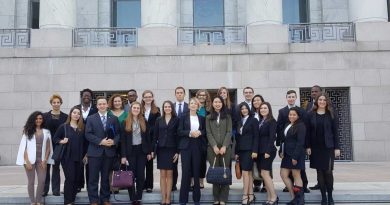Diplomacy Students Dominate SGA Election Roster
By Felipe Bueno
Staff Writer
Seton Hall University’s Student Government Association (SGA) hosted the annual Meet the Candidates event, where students had the opportunity to hear from their potential future representatives. The event, held in the Pirates Cove, allowed candidates from different political parties to present their ideas and platforms regarding the changes they hope to make to the school.
Over the sound of cappuccino machines and orders being called, the candidates presented their platforms in order of position, with those running for the executive board going first, followed by candidates for senators-at-large, then by candidates running to represent specific colleges.
All executive board positions are contested this year, a rarity for SGA. The slate of candidates is a mix of SGA veterans and newcomers. Due to the vast involvement of Diplomacy students on campus, this year’s campaign cycle has Diplomacy majors running for almost every position. Three out of the four candidates for the vice presidency, Chris McNeil, Christian Kainoa Spenser, and Lovesbond Uyanwune, are all Diplomacy majors.
Diplomacy majors have the highest voter turnout rate of any school in the University, which is why McNeil, who is running as vice president to Billy Ray Toney, believes Diplomacy students deserve more representation in SGA, encouraging Diplomacy majors to vote in the upcoming election and to remain active on campus by joining both SGA and Diplomacy clubs.
Transparency between SGA and students was a common theme among those running for president. Adrian Orozco, the presidential candidate for the Reform Party, hopes to place SGA representatives in meetings of both the Board of Regents and the Board of Trustees to ensure greater student representation.
“What drew me to the party is its desire to make SGA a voice for the students, not an arm of the school,” said Spenser, the Reform Party’s vice presidential candidate.
Michael Roma, a sophomore in the Diplomacy School now campaigning for treasurer on the Christina Simon-Violet Reed ticket, discussed implementing club liaisons to strengthen the connection between SGA and the clubs they serve. After the event, Roma told the Envoy that he believes Diplomacy majors are a great asset to the student government due to the interdisciplinary nature of the major. “The political science, economics, and diplomatic aspect of the major is a valuable asset to any field,” he said.
Roma, one of the two incumbent Diplomacy senators, referenced his shortcomings during his tenure. “I wasn’t as involved as I could have been when it came to the different Diplomacy groups like SHUNA and DULCE. For that reason I am very confident in the students campaigning for Diplomacy senators,” he said.
Following the executive board candidates, the candidates for senators-at-large had a chance to discuss their plans for office. Ava Ikbal, a Diplomacy major, stressed her desire to expand diversity inclusion, citing her involvement in the Muslim Student Association as an example. Calloway Korbisch also mentioned the importance of inclusion, not only to groups, but also to individuals. “SGA town halls can be intimidating to an outsider,” she said, “and this intimidation can lead to student’s voices not being heard.”
The last candidates to present were the students running to represent the individual colleges. For the School of Diplomacy, the candidates are Jacob Abel and Efrain Vallejo of the Reform Party, Gabrielle Goldworm and Samuel Planck, and Colin Kilbourne. All candidates are freshmen. Their platforms were similar – more dialogue between the diplomacy students and their senators – but with different methods of implementation.
Abel, an incumbent freshman senator, and Vallejo suggested the creation of a discussion board for students, offering additional office hours exclusively for Diplomacy students, and having a Diplomacy town hall at least once a semester. The SGA Senate has an existing policy of one office hour every week per senator (two hours for senate leadership and executive board officers), and Dean Andrea Bartoli held a town hall last semester that the two incumbent Diplomacy senators did not attend.
“What spurred Gabby and I to run was the disregard the Diplomacy senators showed in the recent vote to condemn President Trump’s travel ban,” said Planck in his speech. “They abandoned the will of their constituents, and instead chose to vote in their own interests.”
Each ticket promised to attend Diplomacy gatherings such as the Dean’s monthly D.U.L.C.E. meetings as frequently as possible and to represent the school’s views. Kilbourne also focused on professional development by connecting students with alumni who are in a similar field.
“Despite it being slightly biased, I would like to see the policies I have implemented live on,” said the outgoing president, Teagan Sebba, reflecting on her two terms. Sebba did not comment on which ticket she would be supporting, although Christina Simon, a candidate for president, ran for secretary on Sebba’s ticket last year.
The SGA election will on Monday and Tuesday, March 27-28. Diplomacy majors are eligible to vote for four executive board positions (president, vice president, treasurer, and secretary), two Diplomacy senators, and six senators-at-large. Students will receive three separate emails containing each ballot.
A full list of candidates can be viewed HERE.

